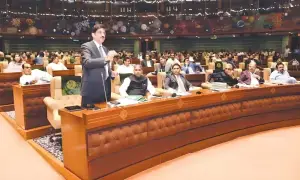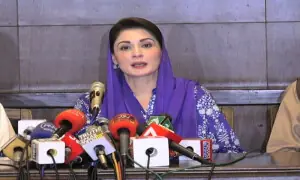IMF seeks more details of funding of PM’s relief package
6 min readFinance Minister Shaukat Tarin said on Sunday the International Monetary Fund (IMF) has sought more details of financing of petroleum levy and electrify prices reduced under Prime Minister Relief Package in response to explanations provided to them and now a response is expected from them today (Monday).
Addressing a news conference ahead of a meeting with the Prime Minister Imran Khan at Bani Gala, in response to a question, Finance Minister said that a response from the IMF was expected on Friday; however, the Fund has sought another day and day and half, and now the response is expected from them before Monday.
The Minister explained the reason behind delay in response from the IMF and stated that the Fund has sought agreements with provinces and SOEs to finance the frozen petroleum levy and electricity tariff cut by Rs 5 per unit under Prime Minister Relief Package when they were informed the money for financing these accounts would come from province and SOEs.
IMF should not have any objections to oil, fuel relief, says Tarin
The Minister said that the IMF would be shared agreements on Monday and his final meeting would be held with them tomorrow (Tuesday), adding that this is not a big deal, as the government has already completed homework and reached agreements with them. Once the understanding reached on the seventh review of Extended Fund Facility (EFF), memorandum of economic and financial policies (MEFP) would be done and subsequently in the first available date of the IMF Board meeting Pakistan review would be taken up.
Replying to another question whether he would work with the next government in case no-confidence move against Prime Minister succeeds, the Minister said that he would not, simply because he was elected as senator on PTI ticket and would not become a ‘Loota’ (turncoat) as ‘he is a man of principle’.
The Minister said the opposition was dreaming, and more the night go longer more their dreams would be long, so they should keep this dreaming. However, he agreed that uncertainty in the country consequent to no-confidence move although not reflected in the numbers yet but it would of course have adverse fall out in numbers. However, he expressed the confidence that the prevailing situation would end in a next few days.
IMF characterises discussions with Pakistan ‘constructive’
Tarin also dismissed the impression of not being happy in the country and stated, as per the happiness index, Pakistan in terms of happiness is placed at in top number in Sought Asia and on fourteenth to fifteenth number in Asia.
The Minister said that Pakistan will not go to international market for launch of Eurobonds till the global market is settled down as Ukraine situation has increased pressure on the currencies of developing countries and increased yield by one and one and half percent.
The Minister said that rating agencies are still in Pakistan’s favour. He stated that he still had $4.5 billion demands but the as the rates are higher, he would not consider them. He said that diesel stock for consumption of 34 days is available in the country.
Earlier, the finance minister said that he asked for press conference to share some positive economic development with media and stated that measures taken by the State Bank of Pakistan, exchange rate movement and various other things have contributed to decline in current account deficit and at the closure of the financial year it is expected to be contained to $15-16 billion.
The Minister said that CAD at this level by itself is no more than four and four and halve percent of the GDP, almost close to 4 percent projected in the budget for the outgoing fiscal year.
He added that CAD was $12 billion during the first eight months this was primarily because of strong growth momentum in the country. He added that increase in exports by 28 percent and contraction in imports to $5.3 billion in February 2022 from $6.3 billion in January, as well as, surge in services exports and increase in remittance; all have contributed to decline in current account deficit. Services exports have increased to $547 million from $521 million, he added.
The minister said that what is more important that for the first time total merchandise exports of $20.6 billion are higher compared to $20.1 billion remittances and this indicates positive trend and some people have been arguing the economy was heading towards 2018 situation owing to increase in current account deficit result. He said that this was not the case because welcome news is that there is 8.2 percent growth of LSM in January 2022 along with robust growth in agriculture sector. LSM has started moving upward in January 2022 after July-August with an incremental growth of 4 percent month on month in January 2022 over December 2021.
All these indicators show that there is strong growth momentum in the economy, he said, adding agriculture crops are showing growth and now wheat crop is estimated to be higher around 5-6 percent whereas and country would might have to import 0.5 to 0.7 million metric tons for building strategic reserves and not 2 million tons.
The minister further stated that there are bumper profits of banks and telecom companies in the services sector and continued that if agriculture, LSM, exports and services sectors are showing growth it means that economy is also growing. As a result, he said that current account deficit was being seen as sign once again moving in the direction of 2018 but the latest numbers shows that the current account deficit began to decrease. Additionally, he said SBP reserves are $16.6 billion and CAD has contracted to $545 million.
He said that there was a hue and cry about dearness and inflation but week-on-week SPI index noted a 1.73 percent decline in the sensitive price is at 15.12 percent; lowest in 36 months, compared to 20.5 or 21 percent of last month.
Tarin said that 6 percent decline in SPI was on account of decrease in essential commodities and electricity price by Rs 5 per unit provided under relief package announced by the Prime Minister. He further stated that relief on electricity tariff translated into relief of Rs 805 in the electricity bill of Rs 1840 which is significant and more impact would be seen in weeks ahead.
Reuters adds: The International Money Fund (IMF) has asked Pakistan to explain how it would fund a $1.5 billion subsidy package announced by Prime Minister Imran Khan, Finance Minister Shaukat Tarin said on Sunday.
“There are no issues. We have given them details as to where the funds would come from,” Tarin said, adding the IMF wanted details of the resources to fund the subsidy in fuel and electricity, which Pakistan has frozen for the next four months until the new budget. The IMF has begun the seventh review of the $6 billion rescue package agreed with Pakistan in 2019, and Tarin said he will have a final meeting with the lender on Tuesday.
The IMF asked it will need to see the agreements of the dividends of State Owned Enterprises (SOEs) as well as details of the spare funds the central government will get from provinces.
“We have done our homework,” Tarin said.
Some of the subsidy money would also come from above-target revenues Pakistan was getting this fiscal year, he had said previously. Earlier this month, Tarin said revenue would hit 6.1 trillion Pakistani rupees ($34.2 billion), compared to a target of 5.8 trillion rupees. Embattled Khan, facing a no-confidence move to oust him from office by opposition parties, had announced a cut in petrol and electricity prices despite a steep rise in the global oil market.
The South Asian country had to undertake fiscal tightening measures to pass its last IMF review, which was delayed by months as the government struggled to complete prior action required by the lender to release $1 billion in February.
The story was originally published in Business Recorder on March 21, 2022.
For the latest news, follow us on Twitter @Aaj_Urdu. We are also on Facebook, Instagram and YouTube.






















Comments are closed on this story.